Communicating with the Toddler Child
As teachers, we are often asked what special tips or tricks we use to get children to cooperate. Most often parents ask questions like “How can I get my child more interested in dressing and eating by themselves?”or “How can we make the mornings run more smoothly?” It can feel challenging when our patience is tested, but we must remember that children are learning to develop their own will and sense of obedience which is a natural process lasting until around six years of age.
Imagine for a moment how it must feel to be shuffled from place to place, in and out of cars, going through your day without much control over what is happening to and around you - this is the reality that our toddlers experience on a daily basis. It makes sense that there is sometimes a pushback or a resounding “No!” It’s important how we show up in these moments, the language we use and the boundaries we choose to set, because we are modeling the behavior we would like to see from the child.

Obedience versus Cooperation
Maria Montessori wrote that “before the child is three he cannot obey unless the order he receives corresponds with one of his vital urges”. This means that the toddler child is obedient only to their own inner drive and impulses which may sometimes align with our requests but not always.
This is why obedience at this age shouldn’t be the goal. In aMontessori classroom, we help children practice using their will and making decisions but we also let them experience the cause and effect of those choices. For example, “I see you didn’t get dressed and now your friends are already outside.” Our goal is to foster the child’s own inner will and drive so that they choose to act and behave accordingly not because an adult told them to, but because they’ve internalized the order, routines, and practices of their environment. Through using encouraging language and consistent actions you can instill values like empathy, independence, cooperation, and respect which will lay the foundation for a positive, loving relationship with your child. Children who feel safe, heard, and loved are more likely to bring their best selves to each situation so building that cooperative relationship and connection with your toddler is where the focus should be at this age.
Supporting and Nurturing Independence
It's important to remember that toddlers are operating on a vastly different level than we are and their brains are taking in a significant amount of information all at the same time. We must give them ample time to process what we are asking them to do while also being kind and gentle to ourselves, remembering that these things take time, patience, consistency, and lots of repetition!

Acknowledge their successes: “I see you are working really hard to put your shirt on, that takes a lot of effort” or “Wow you got ready so fast today!” Be specific in your praise and focus on their process and effort rather than the final outcome. Let them know you saw how long it took them and how hard they worked. This emphasizes to the child that their process, concentration, and their willingness to try new things are what matters. It also helps develop skills like perseverance and resilience.
Ask questions: “Where could you look for that?” or “Do you remember where you put your shoes?” Asking open-ended questions helps build critical thinking and problem-solving skills. Each time they find a solution to a problem on their own, they will gain greater confidence in their ability to overcome challenges. The more confidence they have in their own ability to solve problems, the more likely they are to recover quickly when something distressing happens. It’s also a good idea to keep their things in the same place soy our toddler can be successful at finding what they need on their own.
Offer options: “Would you like to brush teeth or put on pajamas first?” or “Do you want to put on your boots first or your jacket?” Giving your toddler options throughout the day will help them to feel more in control of their body and choices which will create a more cooperative relationship long term. Keep the options limited (no more than 3) and only offer options that are actually available. For instance, if you say “Do you want to go with me or stay at school?” then you’ve backed yourself into a corner as staying at school isn’t really an option.
"Labeling and validating difficult feelings actually helps children learn how to handle them."
Ask how you can help: “Which part would you like my help with?” Offering to help, and specifically letting your child decide how you can help, is a collaborative process. It shows that you are in it together, that it’s okay to ask for help when you need it, and that even really big problems have solutions. Make it clear that you expect them to try on their own first, and you believe they can do it, but if they’re really stuck then you’re right there to help.
Validate and name their emotions: “I see you are crying and you must feel really sad.That can be hard. I’m here for you.” Children need to learn to cope with their emotions; labeling and validating difficult feelings actually helps children learn how to handle them.
"The more confidence they have in their own ability to solve problems, the more likely they are to recover quickly when something distressing happens."
After a toddler has passed their limit and the meltdown has begun, their brain goes into ‘survival mode’ operating as in fight or flight. It can be very difficult for them to communicate in this state, so you can model by taking deep breaths, offering a hug, naming their feelings, and empathizing with them. “You are screaming and you wish you could stay at the park. You look really angry, it’s okay to be mad.”

Cooperative Communication is Built on Trust
Before the child is able to speak, the adult can communicate what is happening and use cooperative language during daily interactions.This can be done through narrating what you are doing, like “We have finished eating so let’s clean up”, “I’m going to help you push your pants down now, here I’ll show you where you can push” or “We are getting ready to go outside, what do we need?” Even if your child is preverbal, asking questions and communicating daily life will help build their language, comprehension, and eventually conversation skills.
“In order to create authentic relationships with our children, there must be integrity in our words and actions.”
If you say it’s time to do something, it’s important that you stick to that and remain consistent, otherwise the child will learn that your words do not hold meaning and they will start to lose trust in you. An important aspect to remember is that toddlers must feel a sense of love and security in order to thrive in their environment, so when your words have meaning and your child knows that you mean what you say, it actually builds trust and helps your toddler to feel safe and loved.
By Lindsay Taylor
Want to learn more? Read our next article:














